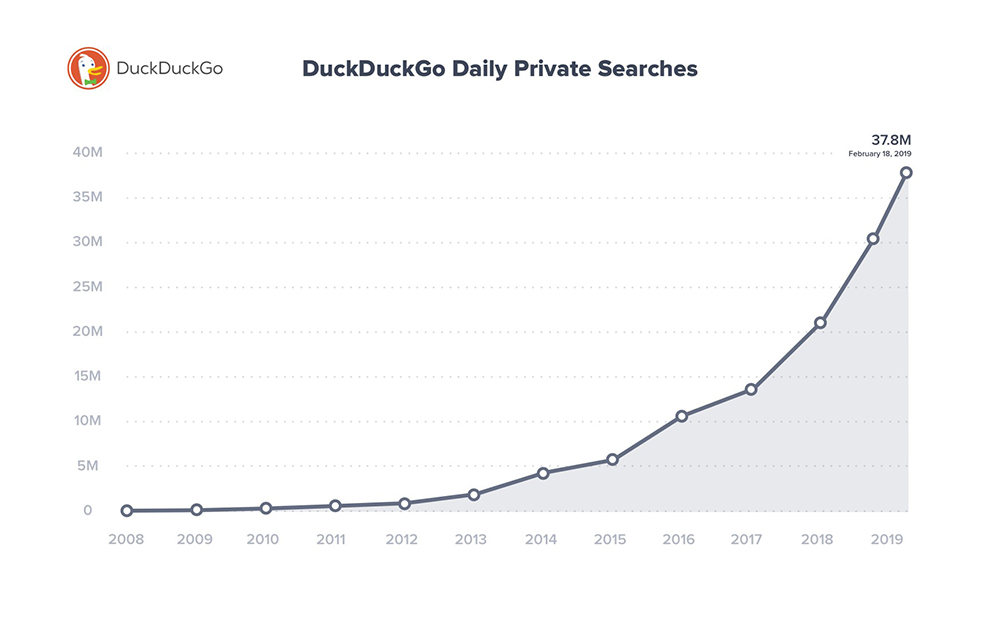The May issue of Admap looks at data ethics. DuckDuckGo, an internet search engine, uses keyword-based advertising as its primary business model. This is in contrast to micro-targeting or behavioural advertising tactics favoured by others. The author outlines some actionable steps digital consumer-focused service companies can take to build a profitable and ethical business.
Founded in 2008, DuckDuckGo's primary service is a search engine alternative to Google that allows consumers to search the web without being tracked. We're the fourth largest search engine in the US, serving over one billion searches a month globally. We also offer a mobile privacy browser that serves as an alternative to Google Chrome.
DuckDuckGo has been profitable using contextual advertising since 2014, without storing or sharing any personal information on people using our search engine. Keyword-based advertising is our primary business model. When you search on DuckDuckGo, we can show you an ad based on the keywords you type in. That’s it. And it works.

Source: DuckDuckGo
This how we make it work (and how other companies can, too).
DuckDuckGo is an internet privacy company that empowers consumers to seamlessly take control of their personal information online, without any trade-offs. Using the Internet shouldn’t make people feel like they are being watched, listened to, and monitored.
Google, Facebook, and the creepy line
Eric Schmidt, former Google CEO and Chairman, famously said “Google’s policy on a lot of these things is to get right up to the creepy line, but not cross it.” But for most people, that line was crossed by Google, Facebook, and others long ago.
Unlike DuckDuckGo, their advertising system is based on tracking users, to enable hyper-targeting, which has many unintended consequences that have dominated the headlines in recent years, such as the ability for bad actors to use the system to influence elections, to exclude groups in a way that facilitates discrimination, and to expose peoples’ personal data to companies they have never even heard of.
But DuckDuckGo’s business model proves that invasive tracking is not the only way to run a profitable digital consumer-focused service company.
It is a choice to squeeze every last ounce of profit at the expense of privacy, democracy and society. Companies such as Google and Facebook could still be among the most profitable companies in the world without extensive tracking, and we’d all be better off.
What other companies can do
Here are a few actionable things companies can do to remain profitable without tracking consumers and eroding their privacy:
- Favor interest-based advertising instead of hyper-targeted advertising. For us, that is basing ads just on the keywords people type in. For others, that could mean basing ads on the content on the page and not on the individual viewing the page i.e. an automotive magazine would feature ads for cars.
- Sell advertising directly based on such interests, avoiding going through the hyper-targeted advertising systems of Google and Facebook. This is taking the digital advertising industry back to its roots in contextual advertising – companies can be profitable, or even become more profitable – without the unintended consequences of behavioral advertising. We’re not the only ones. For example, in response to GDPR, when the New York Times in Europe switched from behavioral advertising to contextual advertising, it reported an increase in revenue.
- Consider using an anonymous affiliate system. DuckDuckGo has non-tracking affiliate partnerships with Amazon and eBay. When consumers visit those sites through DuckDuckGo, including when using !bangs, and subsequently make a purchase, we receive a small commission. This mechanism operates anonymously and there is no personally identifiable information exchanged between us and Amazon or eBay. These partnerships also don't affect the ranking of search results. The reason we can do this in an anonymous way with Amazon and eBay, though not with other retailers, is because Amazon and eBay run their own affiliate networks.
Our vision is to set a new standard of trust online. That’s why DuckDuckGo is a business that is already GDPR and CCPA-compliant. Our privacy policy is straightforward and doesn’t require a law degree to decipher.
The Internet shouldn't feel so creepy and getting the privacy you deserve online should be as simple as closing the blinds.

